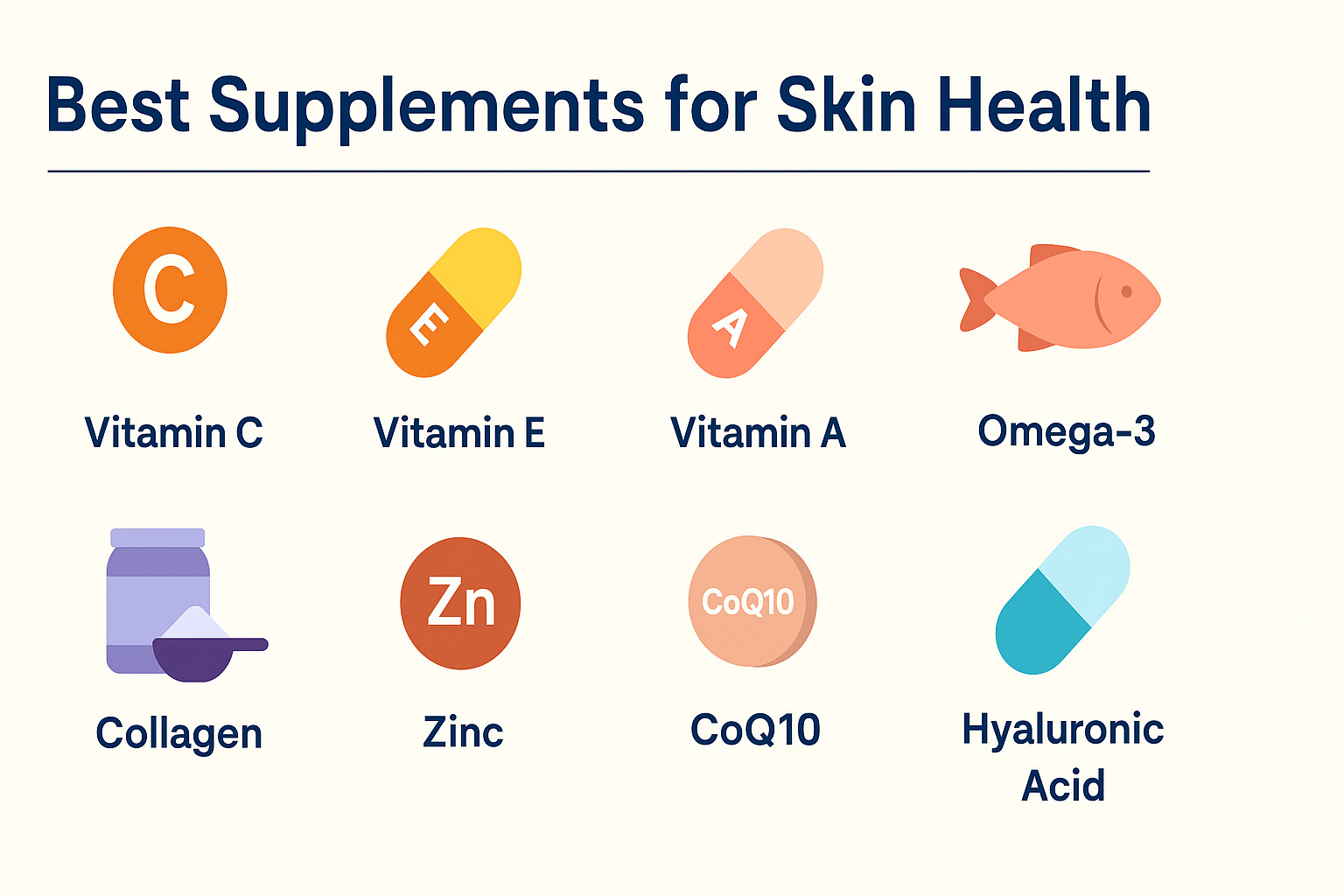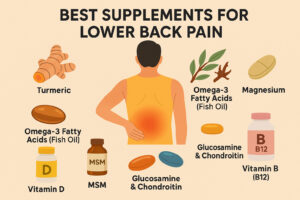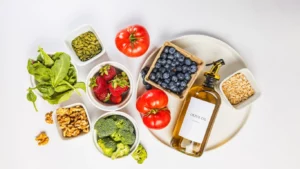Healthy skin is more than just a surface-level goal; it’s an indicator of overall wellness. The skin, being the body’s largest organ, constantly protects us from environmental stressors like pollution, sunlight, and toxins. While skincare products help on the outside, true transformation comes from nourishing the skin from within.
In a world where poor diet, stress, and environmental factors strip our skin of essential nutrients, supplements play an important role. They provide concentrated doses of vitamins, minerals, antioxidants, and fatty acids that the skin needs for repair, hydration, and protection.
This in-depth guide covers the best supplements for skin health, explaining what they do, who they benefit, and how to choose the right ones. Whether your goal is anti-ageing, acne reduction, or enhanced hydration, you’ll find clear, evidence-based advice here.
In This Article
Why Supplements Matter for Skin Health
Your skin is in a constant state of renewal. Every 28 to 40 days, new skin cells replace the old ones, and this regeneration process demands nutrients. Without adequate supply, the skin becomes dull, dry, or prone to breakouts.
How supplements help:
- Fill nutritional gaps that diet alone may not meet.
- Support collagen synthesis to maintain firmness.
- Reduce inflammation for calmer, clearer skin.
- Protect against oxidative damage caused by UV rays and pollution.
The Core Nutrients for Radiant Skin
Vitamin C – Collagen Production and Brightening
Vitamin C is essential for collagen synthesis, the protein responsible for skin elasticity. It also acts as a powerful antioxidant, shielding skin from free radical damage.
Benefits:
- Firms and smooths skin
- Reduces pigmentation
- Speeds up wound healing
- Protects against sun-induced ageing
Best sources: Citrus fruits, strawberries, bell peppers, or supplements with buffered or liposomal Vitamin C.
Vitamin E – Skin Barrier and Moisture Lock
Vitamin E supports the skin’s lipid barrier, preventing moisture loss and providing antioxidant protection.
Benefits:
- Hydration from within
- Soothes sensitive skin
- Minimises UV damage
- Improves texture and softness
Vitamin A – Cell Turnover and Acne Control
Vitamin A, including retinol and beta-carotene, supports faster skin cell renewal.
Benefits:
- Smooths rough texture
- Reduces acne outbreaks
- Minimises fine lines
- Improves skin tone
Caution: Avoid high doses during pregnancy.
Vitamin D – Skin Immunity
Low Vitamin D levels can lead to dryness and skin irritation.
Benefits:
- Enhances skin healing
- Strengthens skin’s defence against infections
- May reduce eczema and psoriasis flare-ups
Key Minerals for Skin Health
Zinc – Acne and Healing Support
Zinc regulates oil production and speeds up healing, making it vital for acne-prone skin.
Benefits:
- Reduces breakouts
- Supports skin repair
- Calms redness and irritation
Selenium – UV and Ageing Defence
Selenium works with Vitamin E to protect against sun-related skin ageing.
Benefits:
- Fights free radicals
- Protects DNA from damage
- Improves skin elasticity
Copper – Elasticity Enhancer
Copper aids collagen and elastin production, keeping skin firm.
Benefits:
- Improves tone
- Reduces sagging
- Promotes even pigmentation
Healthy Fats for Skin
Omega-3 Fatty Acids – Hydration and Anti-Redness
Omega-3s help skin stay soft, supple, and hydrated by strengthening cell membranes.
Benefits:
- Reduces redness
- Supports barrier repair
- Helps with eczema and dryness
Sources: Fish oil, krill oil, algae oil (vegan).
Gamma Linolenic Acid (GLA) – Moisture Retention
Found in evening primrose and borage oil, GLA helps retain skin moisture.
Benefits:
- Relieves dryness
- Calms inflammation
- Improves smoothness
Antioxidants for Youthful Skin
Coenzyme Q10 (CoQ10)
- Energises skin cells for repair
- Reduces fine lines
- Neutralises oxidative damage
Resveratrol
- Found in red grapes
- Protects against environmental damage
- Promotes skin regeneration
Astaxanthin
- Improves elasticity and hydration
- Reduces signs of photoageing
Collagen and Hydration Boosters
Collagen Peptides
- Increase elasticity
- Reduce wrinkles
- Support hair and nails
Hyaluronic Acid (Oral)
- Locks in moisture
- Smooths fine lines
- Improves plumpness
L-Lysine and L-Proline
- Essential for collagen synthesis
- Best taken with Vitamin C
Probiotics – The Gut-Skin Connection
A balanced gut microbiome can reduce skin inflammation and improve conditions like acne, eczema, and rosacea.
Benefits:
- Supports hydration
- Improves nutrient absorption
- Reduces skin sensitivity
Table: Top Supplements for Skin
| Supplement | Primary Benefit | Best For | Additional Benefits |
|---|---|---|---|
| Vitamin C | Collagen & brightness | Ageing, pigmentation | Immunity boost |
| Vitamin E | Hydration & protection | Dry, sensitive skin | Reduces redness |
| Vitamin A | Renewal & acne control | Uneven texture, acne | Wrinkle reduction |
| Omega-3 | Hydration & calm | Redness, eczema | Heart health |
| Collagen | Elasticity & firmness | Wrinkles, sagging | Hair and nail health |
| Zinc | Oil control & healing | Acne-prone skin | Immune defence |
| CoQ10 | Anti-ageing energy | Mature skin | Cardiovascular support |
| Hyaluronic Acid | Moisture retention | Dry, dehydrated skin | Joint lubrication |
Skin Goals and Recommended Supplements
For Anti-Ageing:
- Collagen peptides
- Vitamin C + E
- Astaxanthin
- CoQ10
For Acne Control:
- Zinc
- Omega-3 fatty acids
- Probiotics
- Vitamin A (low dose)
For Dry Skin:
- Omega-3 + GLA
- Hyaluronic acid
- Vitamin E
- Ceramides
Combining Supplements With Diet
When it comes to achieving healthy, radiant skin, supplements and diet are most effective when they work together. While supplements provide concentrated doses of vitamins, minerals, antioxidants, and fatty acids, a nutrient-rich diet supplies additional compounds that may not be found in pill or powder form. This combination helps your body absorb and utilise nutrients more efficiently, delivering visible improvements to your skin.
Why Supplements Alone Aren’t Enough
Supplements are designed to fill nutritional gaps, not replace a balanced diet. Whole foods contain a variety of nutrients, phytonutrients, and enzymes that work synergistically for skin health. For example, taking a Vitamin C supplement can boost collagen production, but pairing it with a diet rich in fresh fruits and vegetables increases the overall antioxidant intake, amplifying the benefits.
Pairing Supplements With the Right Foods
Some supplements work better when paired with certain food types:
- Fat-soluble vitamins like A, D, E, and K absorb best when taken with healthy fats such as avocados, nuts, or olive oil.
- Collagen supplements are more effective when paired with Vitamin C-rich foods like citrus fruits, berries, and bell peppers.
- Iron supplements absorb better with vitamin C sources, while calcium-rich foods can block absorption if taken together.
Skin-Friendly Dietary Habits to Support Supplements
- Eat a rainbow of produce: Colourful fruits and vegetables provide antioxidants that protect against free radical damage.
- Include quality protein: Lean meats, fish, legumes, and eggs supply amino acids essential for collagen production.
- Hydrate consistently: Drinking enough water helps deliver nutrients from supplements and food to skin cells.
- Limit processed foods: Sugar and refined carbs contribute to inflammation, which can undermine the benefits of skin supplements.
Example Daily Routine for Maximum Skin Benefits
Morning: Take a collagen peptide supplement with a smoothie containing spinach, strawberries, and flaxseed.
Lunch: Include a salad with grilled salmon for Omega-3s, avocado for healthy fats, and a vitamin E capsule alongside.
Evening: Have a probiotic-rich meal like yogurt or fermented vegetables to support gut health, paired with a zinc supplement if acne-prone.
The Role of Consistency
Supplements require consistent use to show results, usually over several weeks. Pairing them daily with skin-nourishing meals ensures a constant supply of the nutrients your skin needs for repair and regeneration.
Lifestyle Factors That Enhance Results
Taking the best supplements for skin health is a smart investment, but their full potential is only realised when paired with healthy lifestyle choices. Supplements provide your body with concentrated nutrients, yet how your body processes and uses them depends heavily on your daily habits. Everything from the amount of sleep you get to your hydration levels can influence whether your supplements deliver noticeable improvements to your skin.
Below are the key lifestyle factors that enhance results from skin supplements and help you achieve a glowing, youthful complexion.
1. Prioritise Quality Sleep for Skin Repair
Your skin undergoes most of its repair and regeneration while you sleep. During deep sleep cycles, the body increases blood flow to the skin, delivers nutrients more effectively, and produces collagen to keep skin firm.
Why it matters for supplements: If you are taking collagen peptides, Vitamin C, or antioxidants, quality sleep allows these nutrients to be used more efficiently for skin renewal.
Tips for better sleep:
- Maintain a consistent bedtime routine
- Avoid screens for 30 minutes before sleep
- Keep your room cool and dark
2. Stay Hydrated for Nutrient Delivery
Water is essential for transporting nutrients from supplements and food to your skin cells. Without proper hydration, even the best supplements for skin health cannot perform optimally. Dehydrated skin looks dull, feels tight, and is more prone to fine lines.
Daily goal: Aim for 2–3 litres of water, adjusting based on activity level and climate. Herbal teas and water-rich foods like cucumbers and watermelon also contribute.
3. Manage Stress to Prevent Inflammation
Chronic stress increases cortisol levels, which can break down collagen and trigger inflammation. This leads to breakouts, redness, and premature ageing.
Why it matters for supplements: Nutrients such as Omega-3 fatty acids and antioxidants work to reduce inflammation, but ongoing stress can counteract these benefits.
Stress-reducing practices:
- Meditation or deep breathing
- Gentle exercise like yoga or walking
- Taking regular breaks during work
4. Protect Your Skin from UV Damage
Even the most powerful antioxidant supplements cannot fully repair damage caused by excessive sun exposure. UV rays accelerate collagen breakdown, increase pigmentation, and weaken the skin barrier.
Protective habits:
- Use SPF 30 or higher daily
- Wear wide-brimmed hats and sunglasses
- Seek shade during peak sun hours (10 am–4 pm)
Pairing sun protection with Vitamin C, Vitamin E, and astaxanthin supplements creates a strong defence against photoageing.
5. Maintain a Balanced Diet
Supplements are most effective when they complement a nutrient-rich diet. Whole foods provide additional phytonutrients, fibre, and enzymes that support nutrient absorption and overall skin health.
Diet focus for skin health:
- Colourful fruits and vegetables for antioxidants
- Lean proteins for collagen-building amino acids
- Healthy fats from avocados, nuts, and fish for a strong skin barrier
6. Exercise for Better Circulation
Regular physical activity improves blood flow, ensuring that oxygen and nutrients reach your skin cells more effectively. This enhances the delivery of vitamins, minerals, and antioxidants from supplements to the skin.
Best exercise types for skin benefits:
- Cardio activities like brisk walking, swimming, or cycling
- Strength training to support overall metabolism
- Gentle stretching to improve flexibility and circulation
7. Limit Alcohol and Smoking
Alcohol dehydrates the skin and reduces nutrient absorption, while smoking damages collagen and elastin fibres. These habits can undo much of the progress you make with supplements.
Better alternatives:
- Swap sugary cocktails for antioxidant-rich drinks like green tea
- Replace smoking with stress-relieving alternatives such as herbal teas or breathing exercises
8. Be Consistent with Your Supplement Routine
Taking supplements sporadically will limit results. Consistency ensures a steady supply of nutrients that your skin can use for repair and maintenance.
Practical tips for consistency:
- Take supplements at the same time daily
- Use a pill organiser or set reminders
- Pair supplement intake with daily habits like breakfast or skincare application
9. Avoid Excess Sugar and Processed Foods
High sugar intake can cause glycation, a process that damages collagen and elastin, leading to wrinkles and sagging skin. Processed foods often trigger inflammation, which reduces the effectiveness of skin supplements.
Smart swaps:
- Replace sugary snacks with fresh fruit
- Choose whole grains instead of refined carbohydrates
- Use natural sweeteners like honey in moderation
10. Track Your Progress
Monitoring changes in your skin over time helps you see whether your supplements and lifestyle changes are working.
Ways to track progress:
- Take monthly photos in natural light
- Note changes in texture, hydration, and tone
- Adjust supplement dosage or diet as needed based on results
Potential Side Effects of Skin Health Supplements
The best supplements for skin health can deliver visible improvements in hydration, texture, and overall radiance, but like any health product, they may cause side effects in certain situations.
Understanding these potential effects helps you make informed decisions and use supplements safely. While most people tolerate skin supplements well when taken at recommended doses, overuse, poor-quality products, or specific health conditions can increase the risk of adverse reactions.
Below, we explore common, less common, and serious potential side effects associated with popular skin supplements, along with safety tips to reduce the risk.
1. Digestive Discomfort
Some supplements may cause temporary stomach upset, nausea, or diarrhoea, especially when taken on an empty stomach.
Common causes:
- High doses of Vitamin C may lead to loose stools or bloating.
- Collagen powders sometimes cause mild bloating in sensitive individuals.
- Omega-3 fish oil can lead to a fishy aftertaste or mild reflux.
Prevention tips:
- Take supplements with meals to improve tolerance.
- Start with a lower dose and increase gradually.
2. Allergic Reactions
Allergic reactions can occur if a supplement contains ingredients derived from allergens such as shellfish, soy, or dairy.
Possible signs:
- Itching or rash
- Swelling of lips or eyes
- Difficulty breathing (seek medical attention immediately)
Prevention tips:
- Read ingredient labels carefully.
- Choose hypoallergenic, allergen-free supplements if you have known sensitivities.
3. Vitamin and Mineral Overdose
While vitamins and minerals are essential for skin health, excessive intake can be harmful. Fat-soluble vitamins (A, D, E, K) accumulate in the body and may reach toxic levels over time.
Examples:
- Too much Vitamin A can cause headaches, dizziness, liver damage, and even birth defects if taken during pregnancy.
- High zinc doses may cause nausea, copper deficiency, or weakened immunity.
- Excess selenium can lead to hair loss, nail brittleness, and a metallic taste in the mouth.
Prevention tips:
- Stick to recommended daily allowances (RDAs).
- Avoid combining multiple supplements with overlapping nutrients unless advised by a healthcare provider.
4. Skin Breakouts or Worsening Acne
Some supplements, especially in high doses, may paradoxically worsen acne in certain individuals.
Examples:
- Excessive biotin intake may trigger breakouts by disrupting skin’s oil balance.
- Iodine-rich supplements (like some seaweed extracts) may aggravate acne in sensitive skin.
Prevention tips:
- Introduce one supplement at a time to identify triggers.
- Adjust dosage if skin worsens after starting a new product.
5. Drug Interactions
Some skin supplements can interact with prescription medications, reducing their effectiveness or increasing the risk of side effects.
Examples:
- Vitamin E may increase bleeding risk if combined with blood-thinning medications.
- Omega-3 fatty acids can enhance the effects of anticoagulants.
- Zinc can reduce absorption of certain antibiotics if taken at the same time.
Prevention tips:
- Inform your healthcare provider about all supplements you take.
- Space out supplement and medication intake when advised.
6. Heavy Metal Contamination
Poor-quality supplements may contain traces of heavy metals like lead, mercury, or arsenic, which can accumulate in the body over time and cause health issues.
Risks:
- Neurological damage
- Hormonal imbalances
- Organ toxicity
Prevention tips:
- Choose brands that use third-party testing.
- Avoid unregulated or suspicious online sellers.
7. Unbalanced Nutrient Ratios
Taking a single nutrient in high amounts without balancing it with complementary nutrients can create deficiencies.
Examples:
- High zinc without copper can lead to copper deficiency.
- Excess Vitamin D without magnesium may reduce its effectiveness.
Prevention tips:
- Follow balanced supplement plans.
- Rotate or combine supplements strategically.
8. Rare but Serious Effects
While uncommon, certain supplements can cause severe side effects in sensitive individuals:
- Liver toxicity: Linked to high doses of Vitamin A or poorly regulated herbal supplements.
- Heart rhythm issues: Possible with extremely high doses of certain minerals.
- Severe allergic shock (anaphylaxis): Requires emergency care.
Safety Guidelines to Reduce Risk
- Consult a professional: Always speak to a healthcare provider before starting a new supplement, especially if you have medical conditions or are pregnant.
- Buy from trusted brands: Look for quality seals, GMP certification, and transparent lab testing.
- Start slow: Introduce one supplement at a time to monitor your body’s response.
- Follow the instructions: Avoid the mindset that “more is better.”
- Store supplements correctly: Keep them in a cool, dry place to maintain potency.
Expert Tips for Buying Skin Supplements
- Choose clinically researched doses
- Look for bioavailable forms (e.g., fish oil triglyceride form)
- Avoid fillers and artificial colours
- Check for third-party testing
Quick List: Top Nutrients for Skin Glow
- Vitamin C
- Vitamin E
- Vitamin A
- Vitamin D
- Zinc
- Selenium
- Copper
- Omega-3 fatty acids
- GLA
- Collagen peptides
- Hyaluronic acid
- CoQ10
- Resveratrol
- Astaxanthin
- Probiotics
Conclusion
Your skin’s health depends on what you feed it from within. The best supplements for skin health can make a visible difference in texture, hydration, and resilience when paired with good lifestyle habits and skincare routines.
Whether your concern is ageing, acne, or dryness, the right blend of vitamins, minerals, antioxidants, and healthy fats can help you achieve a radiant, youthful look. Choose wisely, stay consistent, and you’ll see results that last.
Also Read: Best Supplements for Lower Back Pain







